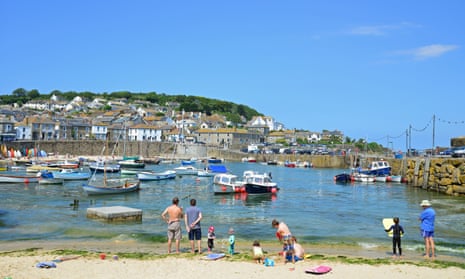Britain’s beach resorts and rural hotspots are expecting a bumper summer as millions more UK tourists opt to holiday at home and overseas tourists are lured by the favourable exchange rate post-Brexit.
A 10% drop in the value of the pound against the euro means that a holiday in a eurozone country will cost a family of four £245 more now than it would have done before Britain voted to leave the EU. This is based on figures from TravelSupermarket, which found that British holidaymakers will take an average of £513 spending money per person in 2016, or £2,052 per family of four.
The sharp rise in the cost of holidaying abroad is likely to lead to a further 5% of British people, or 2.5 million, deciding to holiday at home this year, with Cornwall proving the most popular destination, followed by London, and the Lake District, a survey by online deals site vouchercodes.co.uk found.
The boost to domestic tourism follows a record-breaking first quarter that saw overnight visits in England rise 10% to 7.3m and spending on domestic overnight holidays up 23% to £1.8bn, VisitBritain figures show
“The nearest benchmark we have is the financial crisis of 2008, when there was a boost in staycations. I anticipate the same thing happening [this time],” said Sandra Matthews-Marsh, chief executive of VisitKent. “We are beginning to see an uplift in people staying at home and putting off big spending decisions, including big holidays [abroad].”
At the same time, the fall in the value of the pound has led to a surge in interest from overseas tourists. Search engine Cheapflights said that in the few days after the referendum, flight searches to the UK from the US doubled, with increases of 61% from China, 49% from Canada and 31% from Europe. Similarly, online travel agency Opodo reported a 38% rise in searches for flights to the UK from US markets and 20% from Asia.
British people determined to holiday abroad but yet to book should consider an all-inclusive deal to keep costs down.

“The prices for many of these will have been set well before the drop in the pound and by knowing your food, drink and entertainment are already paid for before leaving the UK, you are insulated from any increase in holiday costs. We are already seeing an increase in popularity in this holiday option by savvy deal hunters,” said Bob Atkinson of TravelSupermarket.
But tour operators are warning that the cost of holidays and flight prices will rise in 2017 if the pound continues at its low level.
Despite the post-Brexit boom in staycations and inbound tourism, British tourism organisations are concerned that some Europeans may feel uncomfortable visiting the UK in the wake of Brexit. In response, VisitBritain is boosting its efforts this summer to target European media. More than 70 journalists from key markets including France, Germany and the Netherlands will be visiting the UK in the coming months as part of a campaign to “show why this summer is a great time to come to Britain”. Chief executive Patricia Yates said the message of welcome would be heavily promoted at this week’s TBEX travel bloggers summit in Stockholm and a bloggers’ conference being held in Inverness in September.
In addition, individual tourist boards across the UK are planning their own publicity drives. Matthews-Marsh said: “We have huge numbers of tourists coming through the tunnel, so we will be doubling our efforts through the media, and working with cross-channel ferries on promotions.”
In the capital, a spokesman for VisitLondon said a social media campaign launched by the mayor’s office, #Londonisopen, was just the start of a series of initiatives to reassure visitors.
Visit Cornwall is working with local accommodation providers to host travel writers and bloggers from German-speaking countries and the Netherlands.
“Perception is all, particularly in tourism, which is a discretionary activity,” said chief executive Malcolm Bell, who received an email immediately after the vote saying, “I’m never coming to Britain again.”
“The biggest concern is people’s attitude to coming because of annoyance at the result [of the vote] or because they feel they are not going to be welcome,” said Bell. “The horrible thing going on now with racial abuse is not playing well. Also, it doesn’t help that [politicians are] almost using EU workers as a bartering tool. It’s not giving the UK a good image.
“We need to get the message out that Brexit was a political decision not an anti-European decision and that people will still have a great time.”
His concerns were echoed by the chief executive of Jamie Oliver’s Fifteen restaurant in Cornwall, after the business revealed it had suffered cancellations from overseas visitors immediately after Britain voted to leave the EU.
“We lost 10% of bookings in the first 10 days after the vote. Dutch and German customers were saying they no longer wanted to come. Someone mentioned that they heard there are racist mobs,” said Fifteen’s Matthew Thomson.
“I’m disappointed but not surprised. The level of anti-European messaging [in the run-up to the campaign] was so high. Now, the onus is on businesses such as ours to shout from the rooftops how keen we are to welcome visitors from across Europe, and that we can give a outstanding experience,” he said.

Comments (…)
Sign in or create your Guardian account to join the discussion